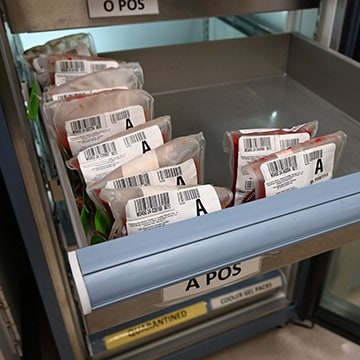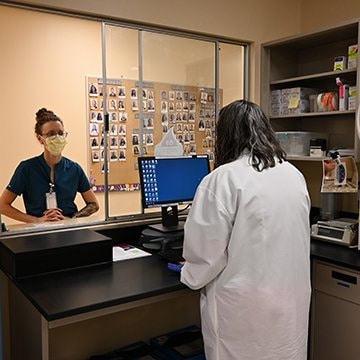Save a life by donating blood
Every two seconds, someone needs blood.
“We typically think of blood being used for traumatic or urgent situations like a car crash or blood loss during surgery,” said Dani Caro, LMH Health Blood Bank supervisor.
While these are all true scenarios, there are many other reasons that patients may require a blood transfusion. Patients who have cancer may require transfusions to treat side effects of chemotherapy. Others who have anemia or iron deficiency receive blood to treat their condition. Patients with bleeding disorders and those who are pregnant or have just given birth may also require blood.
As blood may be needed for a variety of reasons, it also means that the hospital’s supply needs to be replenished each day. LMH Health turns to the Community Blood Center for help.
“There’s no substitute for blood, so there’s always a need for blood donations,” said Kim Clark, Community Blood Center account manager. “While 60% of the population is eligible to donate, only 3 to 4% of those do.”
How do hospitals store blood?

Type A positive blood stored at the LMH Blood Bank
LMH Health organizes blood products into blood types. The Blood Bank typically has 38 red blood cell units, 22 plasma, 4 cryoprecipitate (a portion of plasma) and 1 platelet unit on hand every day.
“The more prevalent a blood type is in our population, the more blood products are in our inventory in that type,” Caro said.
While it doesn’t happen often, LMH Health can reach a “critical” level if there’s a great need for a specific blood product. Caro said that while the Community Blood Center is usually able to fulfill orders, that’s not always the case.
“There are times when we may not be able to get everything due to a blood shortage,” she said. “That’s why donating blood is so important.”
Clark shared that the Community Blood Center tends to see fewer donations during the summer months, when donations can be critical.
“People are on vacation, traveling and are doing summer activities, and that can lead to more accidents, which can cause a need for blood transfusions,” she said.
Am I eligible to donate?
Donating blood is safe, convenient and can save a life. You might not be eligible to donate if you’re not feeling well, take certain medications or have specific medical conditions.
You may be eligible to donate when you are:
- In good health
- 17 years or older (16 with a parent or guardian’s written consent)
- Weigh at least 110 pounds (Additional height and weight restrictions apply for donors age 16-18)
- Not taking antibiotics for infection for at least 48 hours
- Symptom-free for at least 72 hours if you’ve had a cold or the flu
When you arrive at a blood drive or donation center, you’ll check in and fill out an individual donor assessment (IDA). The team will then measure your temperature, hemoglobin level and blood pressure to determine if you can donate that day.
“There are reasons that someone might not be eligible to donate,” Clark said. “Taking certain medications, recently getting a tattoo in some states – other than at licensed facilities in Kansas and Missouri – or traveling to certain areas outside the United States may require you to wait a certain amount of time before donating.”
People living with hemophilia, those who have had viral hepatitis B or C, or have ever had a positive HIV test are permanently ineligible. If you have questions, contact the Community Blood Center at 1-800-668-0900.
If you’re on the receiving end of a transfusion, rest assured that the blood you receive is safe.
“When you donate, each unit of blood is typed and tested. No unit of blood is released for transfusion without passing required tests, including Hepatitis B and C, HIV, syphilis and West Nile virus,” Caro explained.
How often can I donate?

A nurse picks up blood for a patient from the LMH Health Blood Bank
You can’t donate blood every day. The length of time you’re required to wait between donations varies depending on the type of blood component you give.
- Whole blood can be used as a transfusion or separated into its different parts – red cells, white cells, platelets and plasma. You can donate whole blood every 56 days.
- Double red blood cells are collected through a process called apheresis that collects only red blood cells. During your donation, platelets, plasma and a saline solution are returned to your body. You can donate double red cells every 112 days.
- Platelets are blood cells that are essential to clotting. They’re used to treat patients living with cancer, blood disorders or those undergoing a bone marrow transplant. You can donate platelets every 7 days.
- Plasma transports blood cells throughout your body. It’s commonly used to increase blood volume during emergencies and can be used for babies and new mothers and patients who have cancer or immune disorders. You can donate plasma every 28 days.
LMH Health partners with the Community Blood Center to hold blood drives at the Main and West Campuses every two months, which allows for people who donated whole blood at the previous drive to be eligible to donate at the next. If you made a double red cell donation, you’ll be eligible at every other LMH drive.
One other important fact to keep in mind is that blood products donated to the Community Blood Center stay in the region. That means your donation can help someone close to home.
“We supply blood to 68 hospitals in 70 counties in Northeast Kansas and Missouri,” Clark said. “We provide all the blood for LMH Health, The University of Kansas Health System, Children’s Mercy, Advent Health and St. Luke’s. Your donation matters.”
Caro couldn’t agree more. Every blood donation is crucial.
“Donating blood is a selfless act that helps save the lives of others,” she said. “Nine out of every ten individuals will need blood or a blood product at some point in their lives. Donating blood is a powerful way to make a difference in our community and support others on their medical journeys.”
Your opportunity to donate blood is just around the corner! LMH Health blood drives are scheduled on July 11 at the West Campus and July 12 at the Main Campus. Visit savealifenow.org to reserve your spot or to search for other dates and locations.